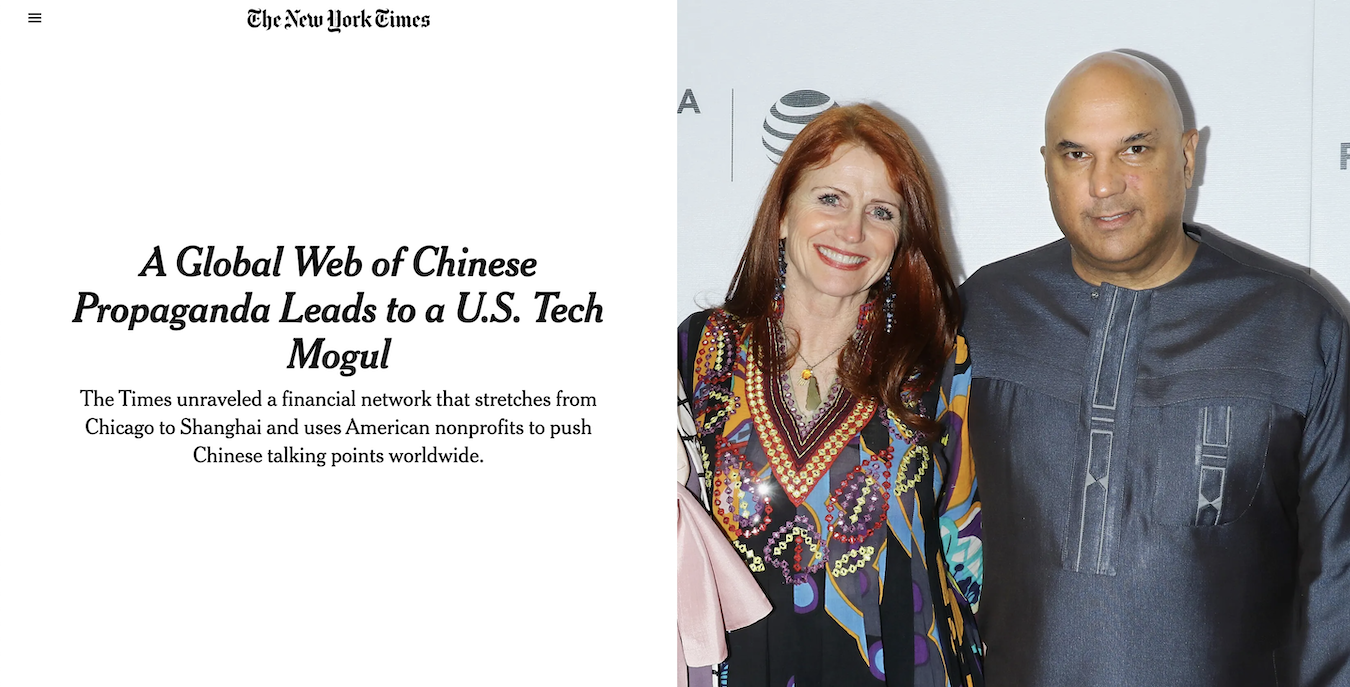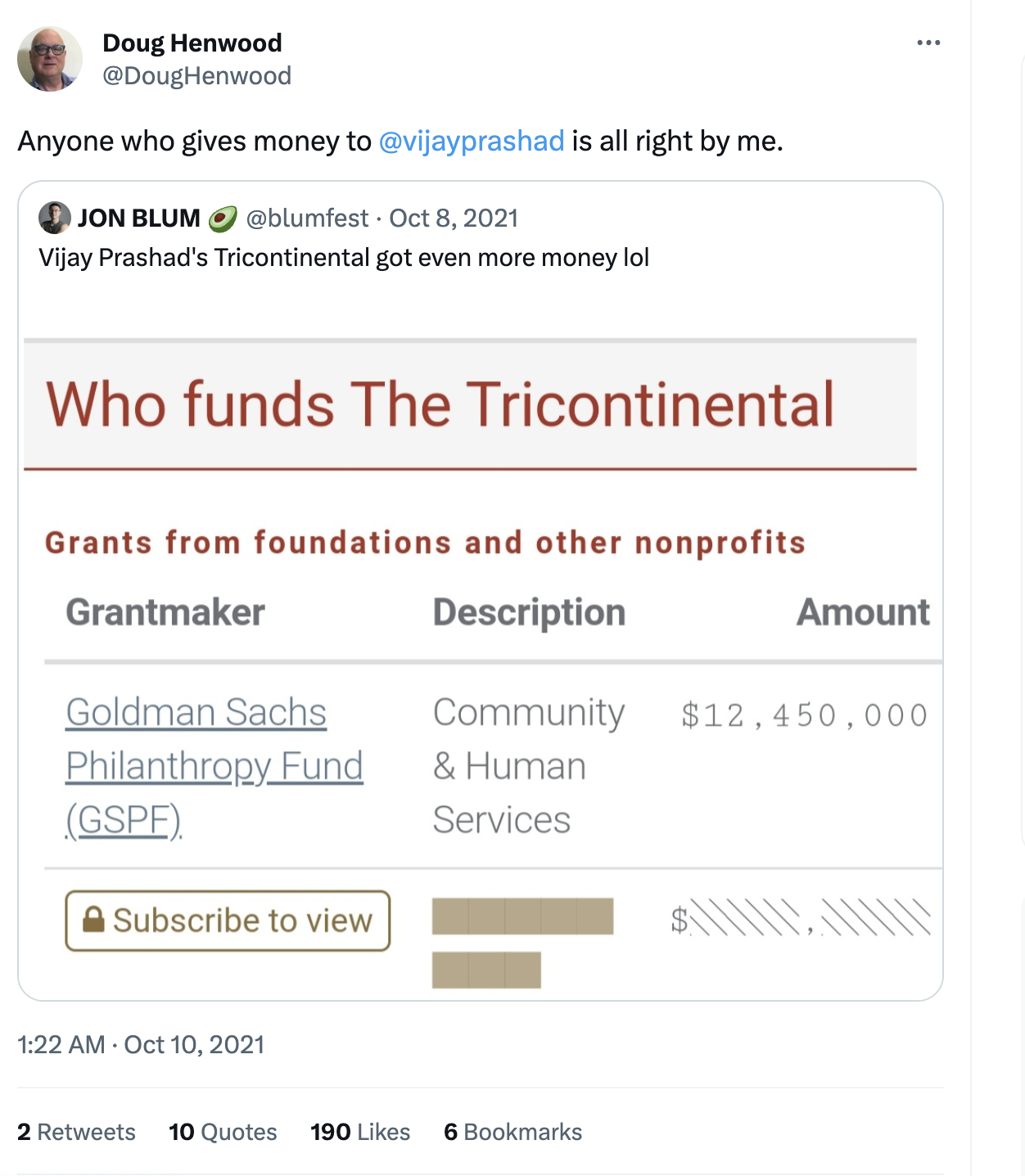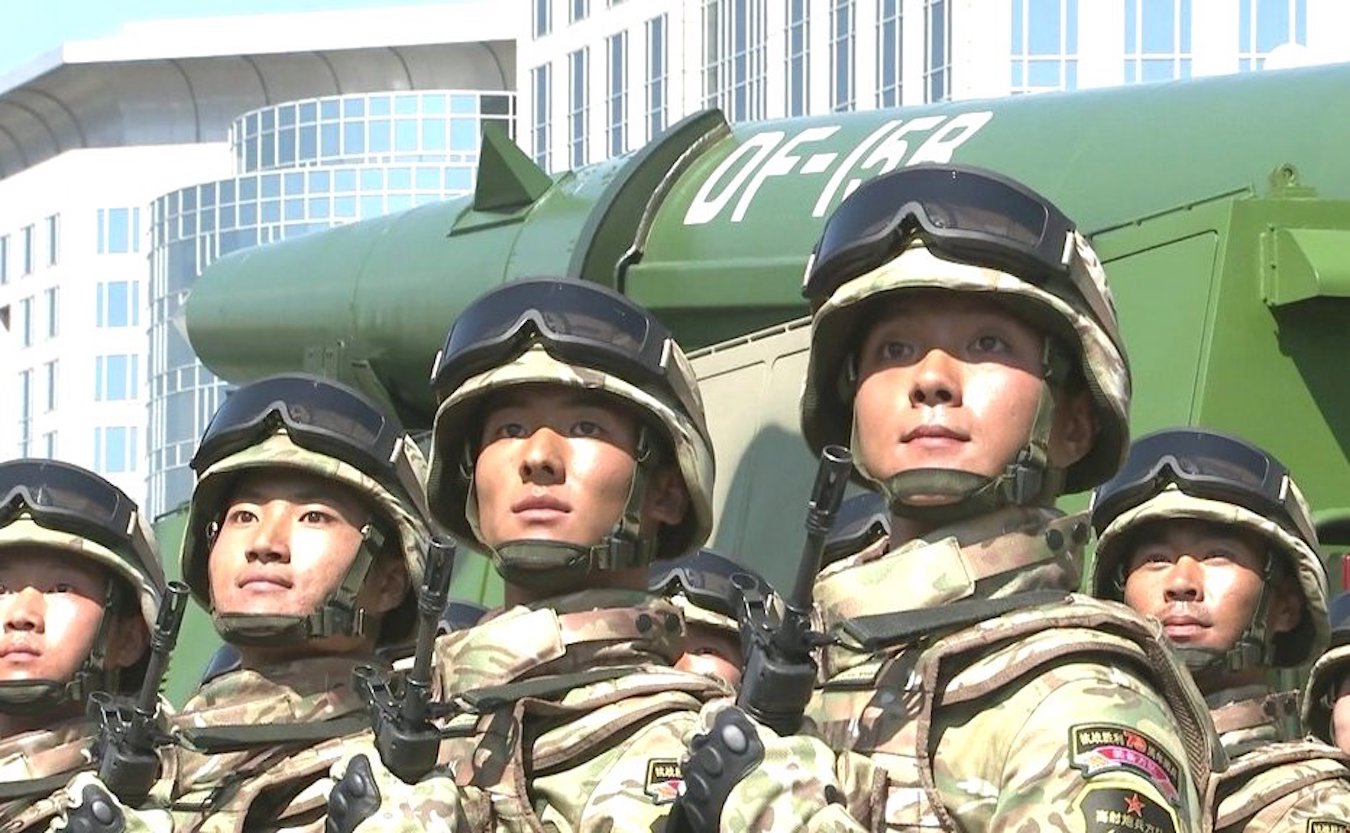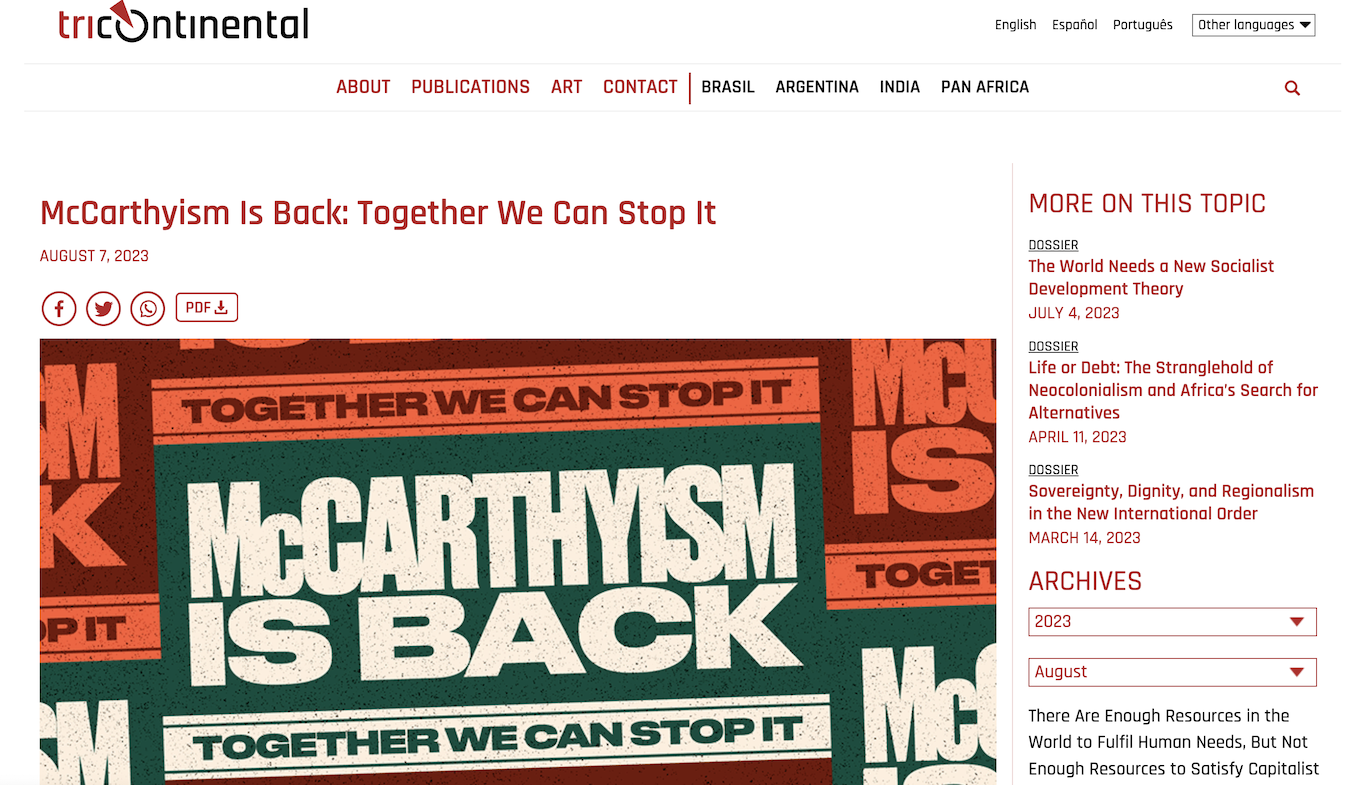by Brian Hioe
語言:
English
Photo Credit: Screenshot
A RECENT EXPOSE in the New York Times on tech multimillionaire Roy Singham, who funds various tankie media outlets, organizations, and institutions such as the Tricontinental Institute, Code Pink, and the People’s Forum in New York City, has led to a petition on the Tricontinental Institute and Code Pink’s websites lashing out against the “new McCarthyism.” This petition was signed by anyone from David Harvey to Radhika Desai, Chris Hedges, and luminaries of the Brooklyn left such as Doug Henwood and The Nation president Bhaskar Sunkara
It proves ironic for such leftist figures to rally behind a wealthy donor that funds groups that whitewash authoritarian regimes. In the past, forums organized by the Tricontinental Institute, People’s Forum, and Code Pink or featuring speakers from these organizations, including many of the signatories of the petition, have denied ethnic cleansing in Xinjiang, claiming that these are merely vocational training camps. Such forums went so far as to paint China as having wholly eliminated poverty, never mind contemporary China’s vast labor discontents, while celebrating Chinese state-run banks–of all things–as “people’s banks.”
 The New York Times article in question
The New York Times article in question
To this end, organizations hosted at such forums are directly ethno-nationalist. One case in point is the Qiao Collective. One essay on Qiao’s website reads:
“Knowing I am Chinese is knowing that the civilization my grandparents, parents, and I descend from produced salt before Europe knew its taste. That it was this civilization that gave birth to thinkers and leaders like Sun Yat-sen, Mao Zedong, and Soong Ching-ling, who saw what the future needed in the face of a West doomed to fall apart and take the rest of the world down with it. These leaders knew more about human progress, requiring a new sense of morality, than the West. […] This civilization existed before the West, and it is something that can inspire our creation of a new world as the modern world as we know it collapses.”
This, of course, reeks of nationalist exceptionalism, reflecting Qiao’s diasporic left nationalist orientation.
It is likely that not all of the signatories justify or support such views. But the fact that Singham-funded groups whitewash ethnic cleansing somewhere outside of the US or Europe is of no real importance to these signatories. In particular, presumably for those personally acquainted with Vijay Prashad and other leading figures of the Tricontinental Institute or similar organizations, it is primarily these personal ties that drive such figures to defend Tricontinental and its work, rather than any examination of their politics. For example, in past comments on social media, Henwood has defended Prashad primarily on the basis of personal acquaintance without accounting for any of Prashad’s views, simply stating that it is good that his friend Prashad is given money by some backer–regardless of who that is.
 Tweet by Doug Henwood about funding of Vijay Prashad by Singham through a Goldman Sachs Philanthropy Fund
Tweet by Doug Henwood about funding of Vijay Prashad by Singham through a Goldman Sachs Philanthropy Fund
But the decided lack of interest in actually accounting for the views of Singham-backed institutions probably reflects how little the rest of the world outside of the West matters for Western leftists. The world outside of Western contexts only matters insofar as it has the potential to draw the US and other Western powers into conflict.
Any views that seemingly justify an “anti-war” stance so long as “war” is invariably conceived from the standpoint of the US and other Western powers. Within this worldview, little attention is paid to the exploitation of Chinese workers and crackdowns on labor organizing, daily assaults on Uyghurs and other minority groups, the repression on political freedoms in Hong Kong, or China’s daily military threats against Taiwan.
Some of the figures that have rallied in defense of Singham have framed the New York Times article as simply another attempt by the imperialist media machine to smear leftist groups. But does it matter if these accusations are true? With reporting by New Lines and other outlets corroborating these reports, it is, after all, not merely the New York Times that has reported on Singham backing such groups. And there are few attempts to account for former workers at Singham-backed publications quoted in the article about how criticism of the Chinese government for labor practices or other issues are removed.
The version of the petition on the Tricontinental Institute website
Indeed, there is a need to actually answer for the allegations of the article rather than merely dismiss it through guilt by association with the New York Times. After all, it proves highly ironic that many of these groups have lashed out at critics in the past with the claim that they are funded by the NED or CIA to try and delegitimize them, but when it turns out that they themselves receive significant funding from a shadowy tech multimillionaire, they feel little need to account for such accusations. To this extent, the trotting out of “new McCarthyism” as a framework for rendering mainstream reporting on Singham-funded groups reflects a poverty of imagination that only reaches back to recent history to understand present global tensions, as seen in the notion of the “New Cold War”. Despite its uses, the “New Cold War” is an occluding framework; nevertheless, contemporary Western leftists seem to be repeating the past mistakes of leftists that idealized or gave a pass to nominally left authoritarian regimes during the first Cold War.
Indeed, for those that do not have to cope with threats from the long arm of the Chinese state, such as surveillance or potential kidnapping, the allegation that the Chinese government may be working with actors such as Singham may seem ridiculous. By contrast, for those that, in fact, live in Asia, it is hardly a surprise to note that the Chinese government spends widely on efforts to promote its image abroad, inclusive of backing media organizations the world over, as such machinated influence can be seen on a daily basis in media outlets across Asia. If such leftists find it problematic that the US funds media organizations to echo its own talking points, why is it any surprise that China would do the same? And why is it that the US’s actions on this front should be condemned, while China’s are not?
The insularity of Western leftists comes as no surprise, as they perceive the world narrowly through the lens of the interests of the West and have no desire to engage with local struggles on their own terms. Even in an age characterized by great power competition between the US and China, Western leftists frame this competition as if it is always and only the US that has agency; the notion that there could be other empires in addition to the US–and that they are all bad–proves very hard to grasp for Western leftists whose thinking about contexts outside of the West amounts to an afterthought at best. Criticizing China is somehow seen as letting the US off the hook, without the rather basic awareness that one can criticize both, and that if whitewashing the actions of the US abroad is bad, so, too, is whitewashing China’s actions.
 Photo credit: Kremlin.ru/WikiCommons/CC BY 4.0
Photo credit: Kremlin.ru/WikiCommons/CC BY 4.0
More generally, one is reminded of the sheer poverty of knowledge that Western leftists have about the world outside of the West. In addition to whitewashing, speakers promoted by Singham-backed groups often make ludicrous statements about the contexts they claim to be speak for, inclusive of downplaying significant conflicts that stand at odds with their worldview, such as rising tensions between India and China in favor of claiming political alignment between BRICS. Yet that this inconsistency is not called out or seen as an issue suggests that the signatories of the “new McCarthyism” petition simply do not think it is necessary to know the world outside of the confines of the Euro-American world, let alone stand in solidarity with its struggles.
And so, ironically, for leftists that claim to oppose global capitalism, the parameters of the signatories’ struggle are actually quite narrow–i.e., anti-capitalist struggle confined to the Western world. Hence why allowing groups such as the Tricontinental Institute or Code Pink to amplify disinformation is seen as harmless, even worthy of Western leftist luminaries rallying in its defense. So much for internationalism.


